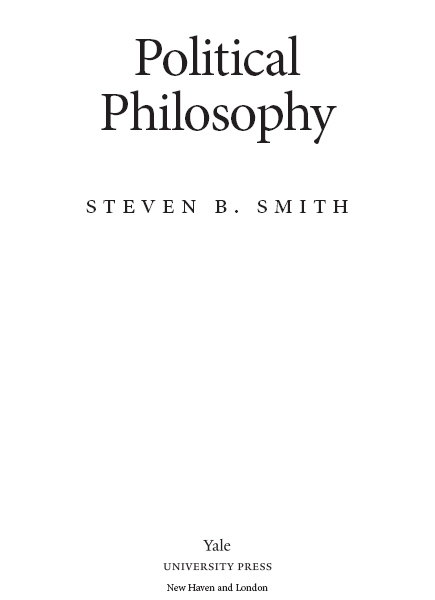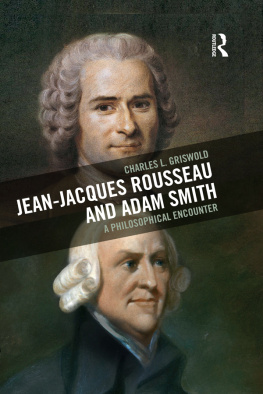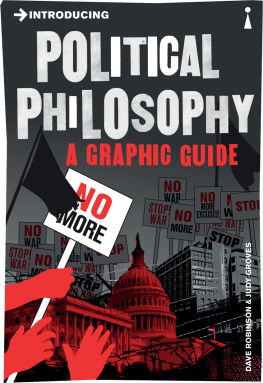Smith - Political Philosophy.
Here you can read online Smith - Political Philosophy. full text of the book (entire story) in english for free. Download pdf and epub, get meaning, cover and reviews about this ebook. City: New Haven, year: 2014, publisher: Yale University Press, genre: Religion. Description of the work, (preface) as well as reviews are available. Best literature library LitArk.com created for fans of good reading and offers a wide selection of genres:
Romance novel
Science fiction
Adventure
Detective
Science
History
Home and family
Prose
Art
Politics
Computer
Non-fiction
Religion
Business
Children
Humor
Choose a favorite category and find really read worthwhile books. Enjoy immersion in the world of imagination, feel the emotions of the characters or learn something new for yourself, make an fascinating discovery.

Political Philosophy.: summary, description and annotation
We offer to read an annotation, description, summary or preface (depends on what the author of the book "Political Philosophy." wrote himself). If you haven't found the necessary information about the book — write in the comments, we will try to find it.
Smith: author's other books
Who wrote Political Philosophy.? Find out the surname, the name of the author of the book and a list of all author's works by series.
Political Philosophy. — read online for free the complete book (whole text) full work
Below is the text of the book, divided by pages. System saving the place of the last page read, allows you to conveniently read the book "Political Philosophy." online for free, without having to search again every time where you left off. Put a bookmark, and you can go to the page where you finished reading at any time.
Font size:
Interval:
Bookmark:
Political Philosophy
THE OPEN YALE COURSES SERIES is designed to bring the depth and breadth of a Yale education to a wide variety of readers. Based on Yales Open Yale Courses program (http://oyc.yale.edu), these books bring outstanding lectures by Yale faculty to the curious reader, whether student or adult. Covering a wide variety of topics across disciplines in the social sciences, physical sciences, and humanities, Open Yale Courses books offer accessible introductions at affordable prices.
The production of Open Yale Courses for the Internet was made possible by a grant from the William and Flora Hewlett Foundation.
RECENT TITLES
Paul H. Fry, Theory of Literature
Christine Hayes, Introduction to the Bible
Shelly Kagan, Death
Dale B. Martin, New Testament History and Literature
Douglas W. Rae, Capitalism: Success, Crisis, and Reform
Ian Shapiro, The Moral Foundations of Politics
Steven B. Smith, Political Philosophy

Published with assistance from the foundation established in memory of Amasa Stone Mather of the Class of 1907, Yale College.
Copyright 2012 by Yale University.
All rights reserved.
This book may not be reproduced, in whole or in part, including illustrations, in any form (beyond that copying permitted by Sections 107 and 108 of the U.S. Copyright Law and except by reviewers for the public press), without written permission from the publishers.
Yale University Press books may be purchased in quantity for educational, business, or promotional use. For information, please e-mail sales.press@yale.edu (U.S. office) or sales@yaleup.co.uk (U.K. office).
Set in Minion type by Westchester Book Group.
Printed in the United States of America.
Library of Congress Cataloging-in-Publication Data
Smith, Steven B., 1951
Political philosophy / Steven B. Smith.
p. cm. (The open Yale courses series)
Includes bibliographical references and index.
ISBN 978-0-300-18180-7 (pbk. : alk. paper) 1. Political sciencePhilosophyHistory. I. Title.
JA71.S498 2012
320.01dc23
2012016209
A catalogue record for this book is available from the British Library.
This paper meets the requirements of ANSI/NISO Z39.481992 (Permanence of Paper).
10 9 8 7 6 5 4 3 2 1
To Dylan, Geoff, Mari, Rebecca, Rek, Yedidya, Yishai, and the memory of the Sunday Club
If you will it, it is no dream.
THEODOR HERZL, ALTNEULAND
Contents
This book grew out of an introductory lecture course on political philosophy that I have taught at Yale for many years. It was a pleasure for me to be able to edit and revise these lectures for Yale University Presss book series.
I have written this book as an introduction to political philosophy rather than the more conventional history of political thought. What I understand by political philosophy is treated in the first chapter. Suffice it to say that political philosophy is a rare and distinctive form of thinking and is not to be confused either with the study of political language in general or with the dry and desiccated form of concept analysis so prominent in the 1950s and 60s. Political philosophy is the investigation of the permanent problems of political lifeproblems like Who ought to govern? How ought conflict to be managed? How should a citizen and a statesman be educated?that every society must confront.
The texts and authors considered here have been chosen because they help to illuminate the permanent problems of political life rather than the particular problems of the times in which they were written. I have not tried to adapt Plato or Machiavelli or Tocqueville to fit our concerns but have aimed to show how our concerns are intelligible only when viewed through the lenses of the most serious thinkers of the past. The problems we confront today, to the extent that they remain political problems, are precisely the same as those confronted in fifth-century Athens, fifteenth-century Florence, or seventeenth-century England. It would be a mistake to think otherwise.
This book is intended for readers who believe, as do I, that we still have something to learn from the great thinkers of the past. This may seem obvious, but it is hotly disputed within the current political science profession. There are those who believe that political science is or should aspire to be a discipline like physics or chemistry or certain precincts of economics and psychology that pay little attention to their own histories. It is to resist this kind of academic amnesia that I have devoted my teaching and writing. My ideal audience is a general readership with no other specialization than a desire to learn.
In writing this book I make no claim to novelty. Most of what I have said is but a reflection on some previous reflection or on a well-known text. Nevertheless, I have put these lectures together in my own way, and they bear my own stamp. I have tried to retain the informal, even conversational, style of the lecture and to avoid the minutiae of academic controversy. I have also kept footnotes and other scholarly references to a minimum, while at the same time I have freely acknowledged my debts to other scholars, teachers, and colleagues from whom I have learned so much over the years.
I have no doubt that I have learned more from writing and rewriting these lectures than have the undergraduates upon whom they have been inflicted. I can only say that it has been an honor and a privilege to have had so many wonderful students who have sat through these classes and expressed an interest in my subject. I would like to give special thanks to a former student, Justin Zaremby, for reading an earlier version of these lectures and for making many helpful comments.
Aristotle, The Politics, trans. Carnes Lord (Chicago: University of Chicago Press, 1984); references are to the Bekker numbers provided in the margin of the text.
Hobbes, Thomas, Leviathan, ed. Edwin Curley (Indianapolis: Hackett, 1994); references are to chapter and section number.
Locke, John, Second Treatise of Government, in Two Treatises of Government, ed. Peter Laslett (Cambridge: Cambridge University Press, 1991); references are to chapter and section number.
Machiavelli, Niccol, The Prince, trans. Harvey C. Mansfield (Chicago: University of Chicago Press, 1985); references are to chapter and page number.
Machiavelli, Niccol, The Discourses of Niccol Machiavelli, trans. Leslie J. Waker, S.J. (London: Routledge and Kegan Paul, 1975); references are to book, chapter, and page number.
The New Oxford Annotated Bible, ed. Herbert G. May and Bruce M. Metzger (New York: Oxford University Press, 1977); references are to chapter and verse number.
Plato, The Republic, trans. Allan Bloom (New York: Basic Books, 1968); references are to the Stephanus numbers provided in the margin of the text.
Plato, Apology of Socrates and Crito, in Plato and Aristophanes: Four Texts on Socrates, trans. Thomas G. and Grace Starry West (Ithaca: Cornell University Press, 1984); citations are to the Stephanus numbers provided in the margin of the text.
Rousseau, Jean-Jacques, The Discourses and Other Early Political Writings, trans. Victor Gourevitch (Cambridge: Cambridge University Press, 1997); references are to page number.
Rousseau, Jean-Jacques, The Social Contract and Other Later Political Writings, trans. Victor Gourevitch (Cambridge: Cambridge University Press, 1997); references are to book and chapter number.
Sophocles, Antigone, trans. Elizabeth Wyckoff (Chicago: University of Chicago Press, 1954); references are to line number.
Tocqueville, Alexis de, Democracy in America, trans. Harvey C. Mansfield and Delba Winthrop (Chicago: University of Chicago Press, 2000); references are to volume, part, chapter, and page number in brackets.
Next pageFont size:
Interval:
Bookmark:
Similar books «Political Philosophy.»
Look at similar books to Political Philosophy.. We have selected literature similar in name and meaning in the hope of providing readers with more options to find new, interesting, not yet read works.
Discussion, reviews of the book Political Philosophy. and just readers' own opinions. Leave your comments, write what you think about the work, its meaning or the main characters. Specify what exactly you liked and what you didn't like, and why you think so.














